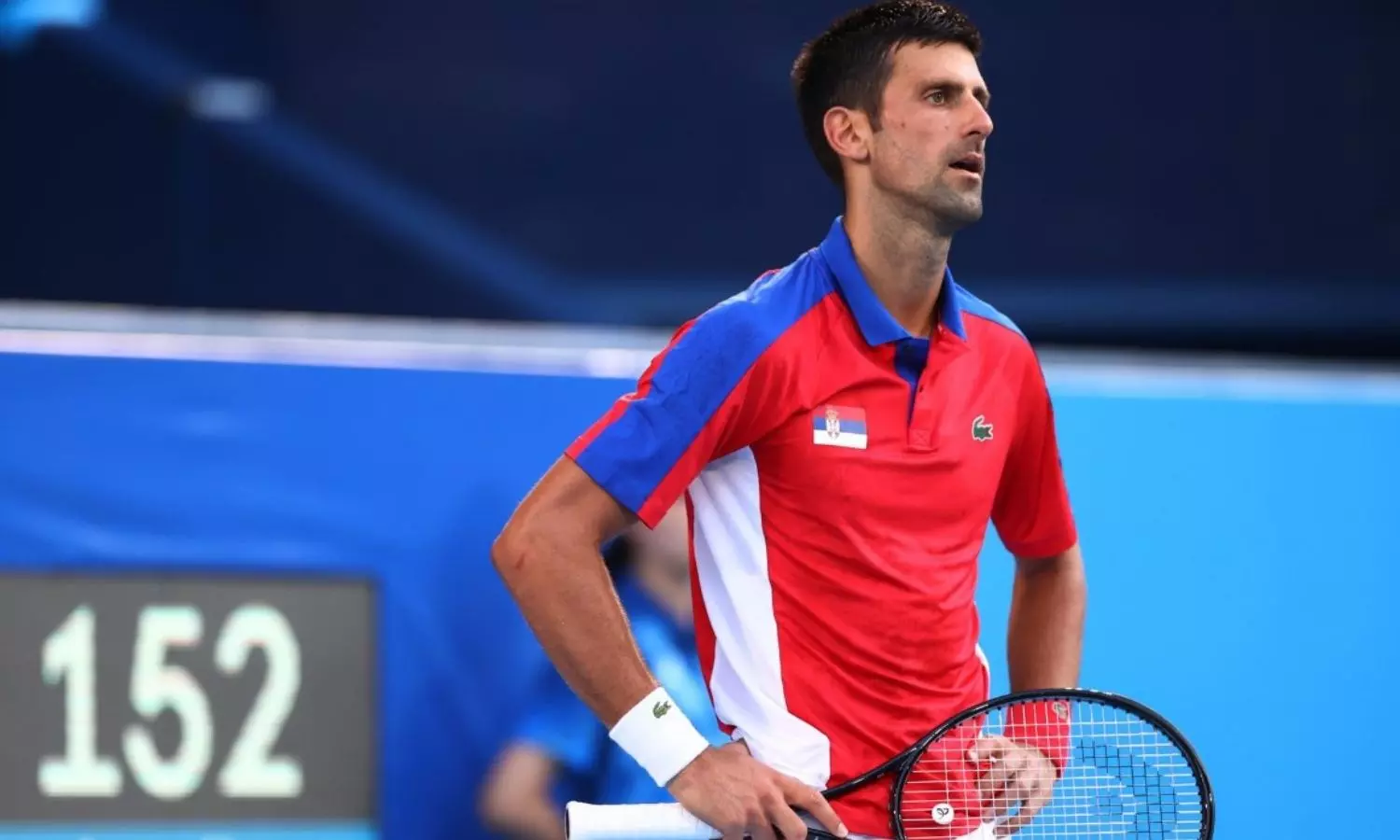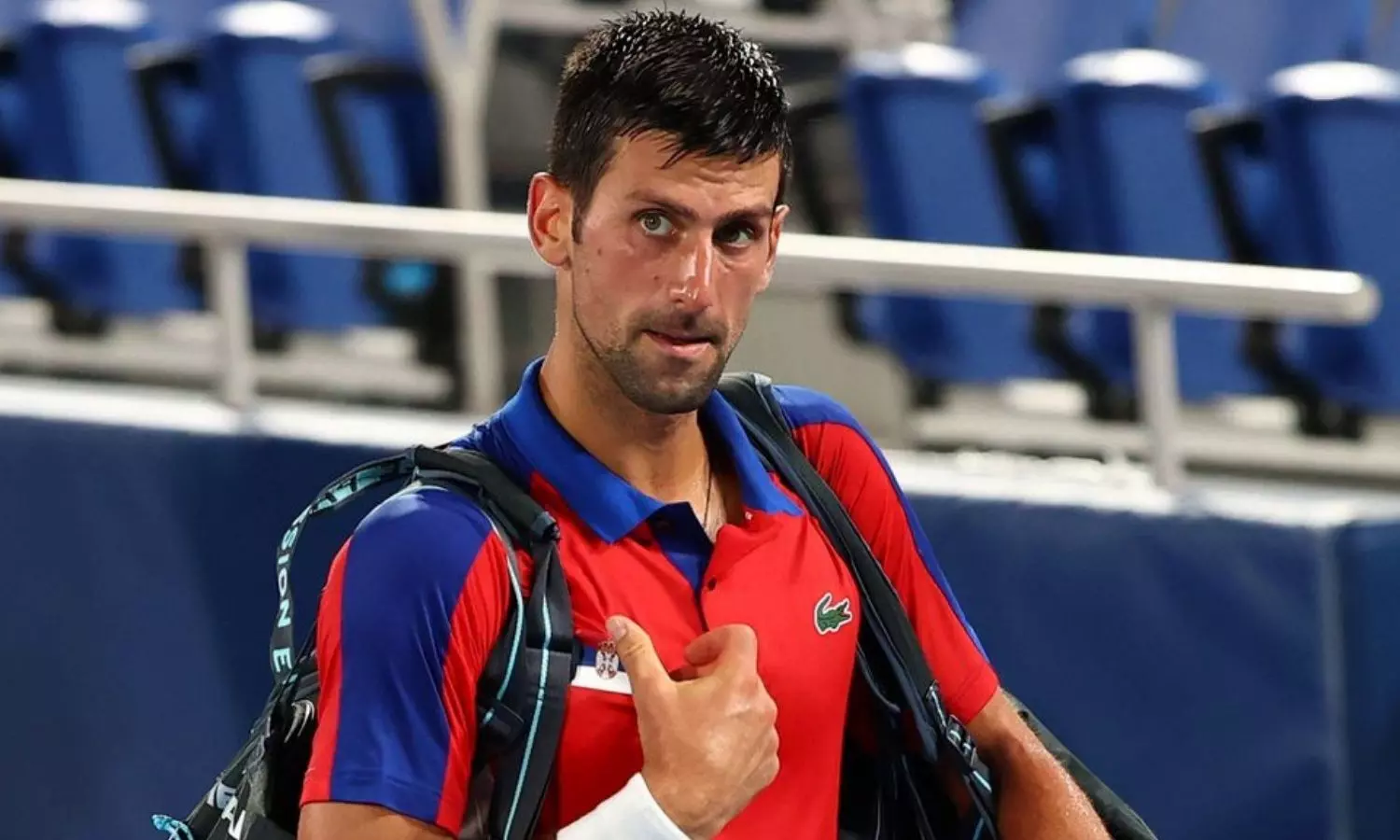Tennis
At these Games we learn again, in sport the inevitable is really nothing
Sports can be cruel and the seemingly impossible can be possible in the blink of an eye as Novak Djokovic's 'invincible' run hit a roadblock at the Tokyo Olympics.

Novak Djokovic (Source: Getty)
It hasn't been a month yet.
Novak Djokovic had just overcome a spirited challenge from Matteo Berrettini to clinch a sixth Wimbledon crown. Having already captured the Australian and French Open titles, the prospect of an occurrence rarer than human beings walking around on the moon was now the dominant conversation in tennis. Not since Rod Laver in 1969 had a male tennis player walked the Holy Grail – the Calendar Slam, winning all four of the sport's major trophies in the same year.
And then there was the dangling carrot. They call it the Calendar Golden Slam. Fate (okay, a pandemic) had delayed the Summer Olympic Games by a year. On Djokovic's horizon, the prospect of a feat, accomplished so far only by the legendary German Steffi Graf, began to appear as more than a mere speck.
Don't believe athletes when they deny this stuff. Legacy and place in history is a driving force when they wake up every morning to inflict pain upon themselves on training courts and in gymnasiums. So, even as the virus continued to batter the host city and his great rivals Roger Federer and Rafael Nadal decided against going, Djokovic mused over the decision he had to make.
"Yeah, that's not a great news. I received that news yesterday or two days ago. That was really disappointing to hear," he responded to a question about the decision to keep spectators away from venues during the Games.
"I also hear that there's going to be a lot of restrictions within the Village. Possibly you would not be able to see other athletes perform live," he went on. "I can't even have my stringer that is very important part of my team. I can't have a stringer. I'm limited with the amount of people I can take in my team as well."
And then, the money quote.
"I'll have to think about it. Right now, as I said, my plan was always to go to the Olympic Games. But right now I'm a little bit divided. It's kind of 50/50 because of what I heard in the last couple days."
So off he went to think about it. Tokyo is at the other end of the world. It will be hot and sweltering. There won't be the crowds that cheered on as he muscled opponent after opponent in Melbourne, Paris and London. He's a tennis player, right? He should prepare for New York. Isn't a Calendar Slam a big enough deal? Why bother?
Nah. Golden Slam. Think Man on the moon. Via Mars. Think History. Think Legacy. Think the Awe with which the accomplishment will be spoken of for decades. Think, Novak, Think.
Make some place for me Steffi, here I come.
So on a plane he hops, no stringer in tow, no entourage in support, only a few of the bells and whistles that accompany him every day as one of the world's leading sporting figures. Fellow athletes from around the world excitedly seek out the superstar among them for pictures and he chuckles through a mock session with gymnasts. A good time is being had and the social media feeds are buzzing. But he remembers why he's here because when he steps on court, Novak Djokovic starts to do what Novak Djokovic does.
He hasn't lost on a hard court all year and we see why. He conceded a sum total of six games in his first match, seven in his second and four in his third. He cruelly dismantles home town boy Kei Nishikori in the quarters, allowing him two games in the first set and bageling him in the second. In the semi-final against the German Alexander Zverev, a player he has beaten in their last four meetings, he races through the first set at the loss of one game in 37 minutes. In the second he breaks Zverev again at 2-2.
Hey Steffi, see you soon!

Much like a boxer on the ropes, bleeding from multiple cuts and scenting the prowling hunter across him, Zverev decides to counter punch. Sport sticks its tongue out to inevitability. History halts mid-paragraph to look up at the here and now.
The German unleashes a barrage of winners and decidedly alters the course of the contest. At the Ariake Tennis Centre Court, the man thought to be unbeatable, appears to melt in the heat. He wins all of one more game in the contest and just like that, like a flash if you weren't paying attention, the dream of a Golden Slam lies shattered to smithereens.
Not long after, Djokovic returns to the adjoining court for a mixed doubles semi-final and is tamed in that one as well. Here is a player that had lost four matches all year. On this balmy Tokyo day, he loses two in one day.
The capitulation of one of the world's premier athletes is why we watch sport and draw life lessons from it. So often days begin with assumptions of the imminent. Yet, turn your eyes away for a moment and a colossus is beaten on a tennis court, an archer from the rampaging Korean team doesn't make a final, a legendary swimmer with a winning run extending back to three Olympics is waylaid by a plucky 20-year old Australian, an American basketball sequence of 25 unbeaten games is scuppered by France.
Athletes get this. This is their working life. Driven as they are by ambition and lofty goals, it is built brick by brick. Point by point. Sprint by sprint. Swim by swim. Arrow by arrow. Shot by shot. They fall, and they rise again, and within that quest, they gift us these treasures. In the aftermath of his crushing defeat, Djokovic reiterated the truism that governs their lives.
"Tough day, a really tough day, I feel so terrible right now," he sighed, before uttering the six words that captured the essence of it all.
"It's just sport. He played better."
Post-Script: Meanwhile, Novak Djokovic produced a heroic performance in the bronze medal play-off against Pablo Carreño Busta of Spain, saving match points in a bruising three setter before going down. With no gas left in the tank, he was forced to concede the bronze medal play-off in the mixed doubles that was to follow. One of the world's leading athletes gave it his all, but left the Tokyo Olympics without a single medal, ringing the truism even more sharply with this exit.
